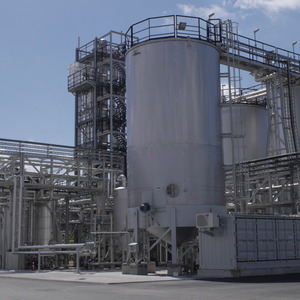St1 Biofuels Etanolix ethanol plant inaugurated in Sweden

St1 Biofuels Oy
June 8, 2015
BY St1 Biofuels Oy
The first Etanolix plant delivered to the international market by St1 Biofuels Oy was recently inaugurated in Gothenburg, Sweden. The plant delivered to North European Bio Tech Oy recycles feedstocks such as biowaste and process residue from local bakeries and bread from shops that is past its sell-by date into ethanol for transport fuel. The ethanol plant is fully integrated into the functions and logistics of St1 oil refinery in Gothenburg and has an annual production capacity of 5 million liters (1.32 million gallons) of advanced bioethanol. The refinery staff will operate the Etanolix plant.
The Finnish energy company St1 is a pioneer in waste-based ethanol production and production technologies. In Finland, there are already four Etanolix plants and one Bionolix plant that produces ethanol from biowaste from shops and households. The first Cellunolix plant using sawdust as a feedstock, will begin production in Kajaani, Finland, next year.
The Finnish investor of the new Gothenburg ethanol plant, NEB, is an associated company of SOK Corp. and energy company St1 whose purpose is to invest in biofuel production units. The production capacity of the plant will be leased to North European Oil Trade Oy. NEOT is sister company to NEB and it is the most significant independent fuel supply company in the Baltic Sea region. It delivers fuels to major Nordic service station chains—ABC, St1 and Shell—with a total of 1,500 service stations in Finland, Sweden and Norway.
Advertisement
Advertisement
Thanks to its feedstocks and production technology, the ethanol produced at the Etanolix plant will be almost carbon-neutral. The plant is fully integrated into the functions and logistics of the refinery, which will yield significant synergy benefits in the use of residual heat and cooling and in product distribution.
“Building the ethanol plant in Gothenburg is a significant launch on the international market for us. Our scalable Etanolix concept is a finished export product. Ethanol produced using our technology generates virtually no lifecycle fossil emissions,” says Patrick Pitkänen, head of business development and sales at St1 Biofuels.
Advertisement
Advertisement
The Gothenburg plant is the first biofuel production plant for NEOT, which is an oil and biofuel wholesale trading company. “By investing in biofuel production of our own, we are strengthening our sourcing of biofuels and supporting our strategy of fulfilling growing biofuels mandate,” says Henrikki Talvitie, managing director of NEOT.
The Gothenburg project has been selected for inclusion in the Life+ program of the European Commission, which provides funding for projects for instance on energy, the climate, environmental management, industry and production, waste management and environmental policy. This project is the first in which an ethanol production plant has been integrated at an existing oil refinery to produce waste- and residue-based ethanol on a sustainable basis.
Related Stories
Calumet Inc. on Aug. 8 confirmed its Montana Renewables biorefinery is currently running at full capacity. An initial phase of the company’s MaxSAF initiative remains on track to boost SAF capacity to up to 150 MMgy by mid-2026.
The USDA maintained its outlook for 2025-’26 soybean oil use in biofuel production in its latest World Agricultural Supply and Demand Estimates report, released Aug. 12. The forecast for soybean oil prices was also unchanged.
U.S. soybean production for 2025 is forecast at 4.29 billion bushels, down 2% when compared to last year, according to the USDA National Agricultural Statistics Service’s latest monthly Crop Production report, released Aug. 12.
Marathon Petroleum Corp. on Aug. 5 released second quarter financial results, reporting improved EBITDA for its renewable diesel segment. The company primarily attributed the improvement to increased utilization and higher margins.
Chevron Corp. on Aug. 1 confirmed the company started production at the Geismar renewable diesel plant in Louisiana during the second quarter after completing work to expand plant capacity from 7,000 to 22,000 barrels per day.
Upcoming Events










